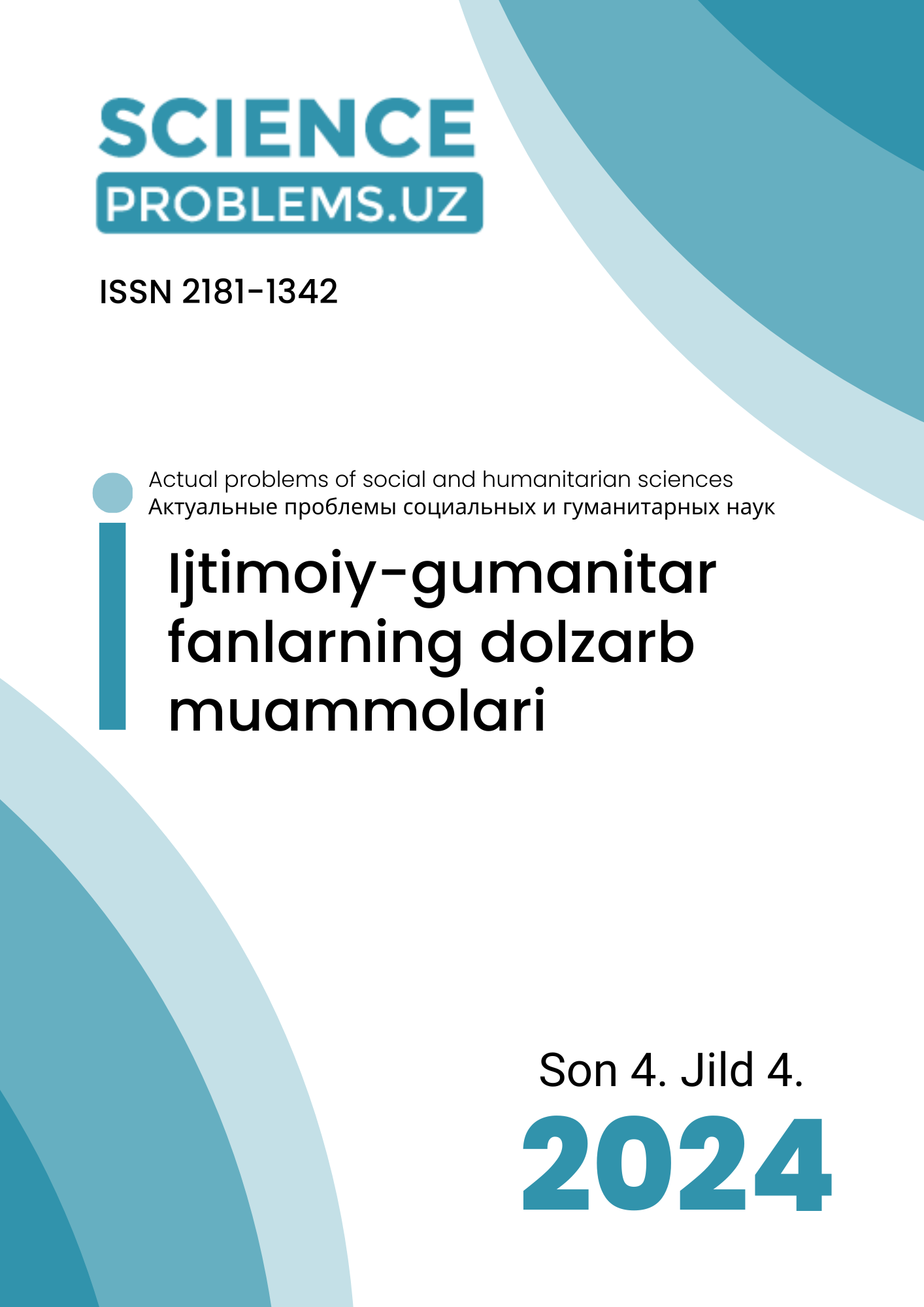TALABALARDA KASBIY KO`NIKMALARNI SHAKLLANISHIDA MIKROTA`LIM O`QITISH TEXNOLOGIYASINING SAMARALI JIHATLARI
Kalit so'zlar
https://doi.org/10.47390/SPR1342V4I4Y2024N71Kalit so'zlar
mikrota`lim metodi, o`qituvchining kasbiy mahorati, rejalashtirish,o`rgatish, kuzatish prinsiplariAnnotasiya
Ushbu maqolada bo`lajak ingliz tili o`qituvchilarining pedagogik ta’lim jarayonida mikrota’lim metodining ahamiyatli jihatlari yoritilgan. Uning muammolari, imkoniyatlari va foydalanish istiqbollari keltirilgan. Mikrota'limda o'qitishning amaliy ko'nikmalarni oshirish usuli belgilangan. Mikrota'lim metodi orqali o'qituvchining kasbiy mahoratining shakllanishi bosqichma-bosqich jarayonda keltirilgan .
Manbalar
Tolipov 0 ‘. 0 ‘qituvchilar tayyorlashda yangi pedagogik texnologiyalar. // J. Xalq ta’limi. №2. 2000.
0chilov M . Yangi pedagogik texnologiyalar. - Qarshi: Nasaf, 2000.
Saidahmedov N. Yangi pedagogik-texnologiyalar (nazariya va amaliyot) - Toshkent: Moliya, 2003.
Allen, D. W. & Eve, A. W. (1968). Micro teaching. Theory into Practice, 7(5), 181-185.
Singh LC, Sharma RD. New Delhi: Department of Teacher Education NCERT; 1987. Micro-teaching – Theory and Practice. [Google Scholar]
Chen Q, Zeng F, Yang Z. Study on the effects of multimedia monitoring system in medical teacher's microteaching training. Comput Inf Sci. 2010;3:241–3. [Google Scholar]
Amobi, F. A., and Irwin, L. (2009). Implementing on-campus micro teaching to elicit pre-service teachers‟ reflection on teaching actions: Fresh perspective on an established practice. Journal of the Scholarship of Teaching and Learning, 9(1), 27-34.
Sadiq A. A. I. (2011) .Student Teachers‟ Microteaching Experiences in a Pre-service English Teacher Education Program. Journal of Language Teaching and Research, 2(5), 1043-1051.
Luo, T., & Gao, F. (2012). Enhancing classroom learning experience by providing
structures to microblogging-Based activities. Journal of Information Technology
Education, 11, 199-211.
Mills, R. F. (1991). Micro-peer teaching: Organization and benefits. Education, 111, 559-562.
Плигин, А.А. Образовательная технология и обучение педагогов основам ее проектирования / А.А.Плигин // Школьные технологии. –2008. – №2. – С. 9- 16.
Bell A, Mladenovic R. The benefits of peer observation of teaching for tutor development. High Educ. 2008;55:735–52. [Google Scholar]
MaKinster, J. G., Barab, S., Harwood, W., & Andersen, H. (2006). The effect of social Context on the reflective practice of pre-service science teachers: Incorporating a Web-supported community of teachers. Journal of Technology and Teacher
Education, 14(3), 543-579
I’Anson J, Rodrigues S, Wilson G. Mirrors, reflections and refractions: The contribution of microteaching to reflective practice. Eur J Teach Educ. 2003;26:189–99. [Google Scholar]
MacLeod G. Microteaching in Teacher Education. In: Anderson LW, editor. International Encyclopaedia of Teaching and Teacher Education. Oxford: Pergamon Press; 1995. pp. 573–7. [Google Scholar]
Ananthakrishnan N. Microteaching as a vehicle of teacher training – Its advantages and disadvantages. J Postgrad Med. 1993;39:142–3. [PubMed] [Google Scholar]
Roush RE. Being “on stage”: Improving platform presentation skills with microteaching exercises and feedback. Gerontol Geriatr Educ. 2008;29:248–56. [PubMed] [Google Scholar]
Van Ort S, Woodtli A, Hazzard ME. Microteaching: Developing tomorrow's teachers. Nurse Educ. 1991;16:30–3. [PubMed] [Google Scholar]








